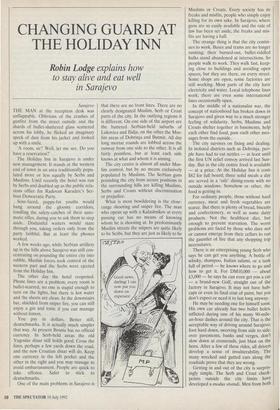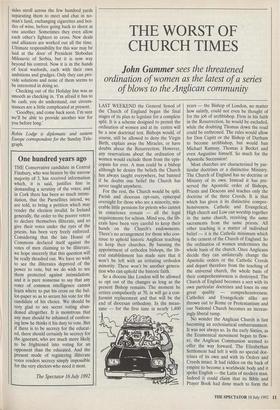CHANGING GUARD AT THE HOLIDAY INN
Robin Lodge explains how
to stay alive and eat well in Sarajevo
Sarajevo THE MAN at the reception desk was unflappable. Oblivious of the crashes of gunfire from the street outside and the shards of bullet-shattered glass scattered across his lobby, he flicked an imaginary speck of dust from his jacket and looked up with a smile.
'A room, sir? Well, let me see. Do you have a reservation?'
The Holiday Inn in Sarajevo is under new management. It stands at the western end of town in an area traditionally popu- lated more or less equally by Serbs and Muslims. Until recently the hotel was run by Serbs and doubled up as the public rela- tions office for Radovan Karadzic's Ser- bian Democratic Party.
Sour-faced, puppy-fat youths would hang around the gloomy corridors, fondling the safety-catches of their auto- matic rifles, daring you to ask them to step aside. Disdainful waiters would stare through you, taking orders only from the party faithful. But at least the phones worked.
A few weeks ago, while Serbian artillery up in the hills above Sarajevo was still con- centrating on pounding the entire city into rubble, Muslim forces took control of the western part and the Serbs were ejected from the Holiday Inn.
The other day the hotel reopened. Phone lines are a problem; every room is bullet-scarred, no one is stupid enough to turn on the lights, but there is hot water and the sheets are clean. In the downstairs bar, shielded from sniper fire, you can still enjoy a gin and tonic if you can manage without lemon.
You pay in dollars. Better still, deutschmarks. It is actually much simpler that way. At present Bosnia has no official currency. In Serb-held areas the old Yugoslav dinar still holds good. Cross the lines, perhaps a few yards down the road, and the new Croatian dinar will do. Keep one currency in the left pocket and the other in the right and you may manage to avoid embarrassment. People are quick to take offence. Safer to stick to deutschmarks. '
One of the main problems in Sarajevo is that there are no front lines. There are no clearly designated Muslim, Serb or Croat parts of the city. In the outlying regions it is different. On one side of the airport are the battered Serbian-held suburbs of Lukovica and Ilidja, on the other the Mus- lim areas of Dobrinja and Butmir. All day long mortar rounds are lobbed across the runway from one side to the other. It is all fairly pointless, but at least each side knows at what and whom it is aiming.
The city centre is almost all under Mus- lim control, but by no means exclusively populated by Muslims. The Serbian guns pounding the city from secure positions in the surrounding hills are killing Muslims, Serbs and Croats without discrimination or prejudice.
What is most bewildering is the close- range shooting and sniper fire. The man who opens up with a Kalashnikov at every passing car has no means of knowing whom he is shooting at. In predominantly Muslim streets the snipers are quite likely to be Serbs, but they are just as likely to be Muslims or Croats. Every society has its freaks and misfits, people who simply enjoy killing for its own sake. In Sarajevo, where guns are so easily available and the rule of law has been set aside, the freaks and mis- fits are having a ball.
The strange thing is that the city contin- ues to work. Buses and trams are no longer running; their burned-out, bullet-riddled hulks stand abandoned at intersections. So people walk to work. They walk fast, keep- ing close to buildings and avoiding open spaces, but they are there, on every street. Some shops are open, some factories are still working. Most parts of the city have electricity and water. Local telephone lines work; there are even some international lines occasionally open.
In the middle of a nationalist war, the concept of nationhood has broken down in Sarajevo and given way to a much stronger feeling of solidarity. Serbs, Muslims and Croats shelter together in basements, help each other find food, pass each other mes- sages from the outside.
The city survives on fixing and dealing. In isolated districts such as Dobrinja, peo- ple have had to eat nettles — at least until the first UN relief convoy arrived last Sun- day. But in the city centre food is available — at a price. At the Holiday Inn it costs $82 for full board; three solid meals a day are served in a 'safe' dining-room with no outside windows. Somehow or other, the food is getting in.
For ordinary people, those without hard currency, meat and fresh vegetables are scarce. But there is plenty of bread, biscuits and confectionery, as well as some dairy products. Not the healthiest diet, but enough to prevent starvation. The worst problems are faced by those who dare not or cannot emerge from their cellars to run the gauntlet of fire that any shopping trip necessitates.
There is an enterprising young Serb who says he can get you anything. A bottle of whisky, shampoo, Italian salami, or a tank full of petrol — he knows where to go and how to get it. For DM10,000 — about 0,000 — he says he can even get you a car — a brand-new Golf, straight out of the factory in Sarajevo. It may not have hub- caps or even its final coat of paint, but you don't expect or need it to last long anyway.
He may be needing one for himself soon. His own car already has two bullet holes, inflicted during one of his many 90-mile- an-hour dashes around the city. That is the acceptable way of driving around Sarajevo; foot hard down, swerving from side to side, over pavements, banks and verges, don't slow down at crossroads, just blast on the horn. After a few of these rides, all drivers develop a sense of invulnerability. The many wrecked and gutted cars along the roadside prove that they are wrong.
Getting in and out of the city is surpris- ingly simple. The Serb and Croat check- points outside the city limits have developed a modus vivendi. Men from both sides stroll across the few hundred yards separating them to meet and chat in no- man's land, exchanging cigarettes and bot- tles of wine, before going back to shoot at one another. Sometimes they even allow each other's fighters to cross. New deals and alliances are worked out all the time. Ultimate responsibility for this war may be laid at the door of President Slobodan Milosevic of Serbia, but it is now way beyond his control. Now it is in the hands of local warlords, each with their own ambitions and grudges. Only they can pro- vide solutions and none of them seems to be interested in doing so.
Checking out of the Holiday Inn was as smooth as checking in. 'I'm afraid it has to be cash; you do understand, our circum- stances are a little complicated at present.
'Goodbye, and come back soon. I'm sure we'll be able to provide another war for you before long.'
Robin Lodge is diplomatic and eastern Europe correspondent for the Sunday Tele- graph.



















































 Previous page
Previous page